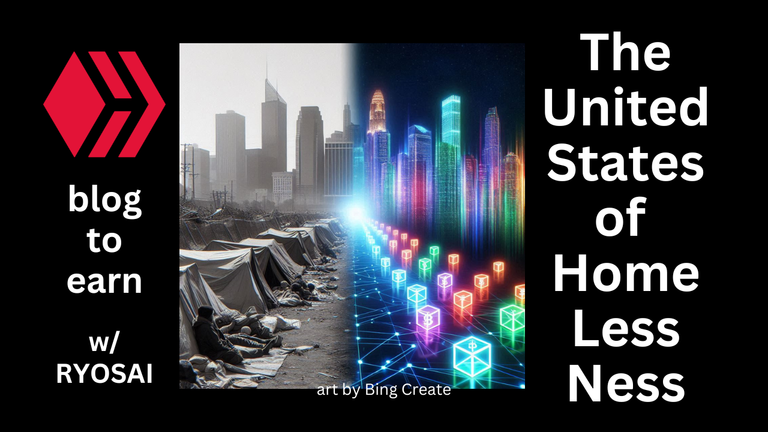
Blockchain Helps Solve Homelessness
Homelessness remains one of the most pressing social issues in the United States, with over 580,000 people experiencing homelessness on any given night (as reported by the U.S. Department of Housing and Urban Development in 2023).
Meanwhile US Census Bureau reports a housing vacancy over 15 million homes giving a ratio of 25 vacancies to every homeless individual.
These statistics remain an egregious example of the greed and corruption of centralized finance and create the perfect environment for the creation of blockchain technology.
Despite billions of dollars spent on shelters, housing programs, and social services, the problem persists due to systemic inefficiencies, lack of transparency, and bureaucratic hurdles.
Could blockchain technology offer a viable solution?
By leveraging decentralization, transparency, and smart contracts, blockchain has the potential to revolutionize how we address homelessness—ensuring that aid reaches those who need it most while reducing fraud and mismanagement.
The Current Crisis: Why Traditional Systems Fail
Lack of Affordable Housing – Rising rent prices and stagnant wages push more people into homelessness.
Inefficient Aid Distribution – Government and nonprofit funds often get lost in administrative costs or fail to reach the intended recipients.
Identity and Documentation Barriers – Many homeless individuals lack IDs, making it difficult to access services or secure employment.
Fraud and Mismanagement – Without transparent tracking, funds can be misallocated or misused.

How Blockchain Can Help Solve Homelessness
- Transparent Charitable Donations
Blockchain enables fully traceable donations, ensuring funds go directly to housing programs, food, or medical care. Smart contracts can automate aid distribution, eliminating middlemen and reducing fraud.
Example: A donor sends cryptocurrency to a homeless aid DAO (Decentralized Autonomous Organization), which automatically allocates funds to verified shelters or rental assistance programs.
- Digital Identity Solutions
Many homeless individuals lose their IDs, making it nearly impossible to access jobs or government assistance. Blockchain-based self-sovereign identity (SSI) systems can provide secure, verifiable digital IDs stored on a decentralized ledger.
Use Case: A nonprofit issues blockchain-based IDs to homeless individuals, allowing them to access services, apply for jobs, and receive benefits without physical documents.
- Tokenized Housing Incentives
Cities could create housing tokens as incentives for landlords to rent to homeless individuals. These tokens could be traded for tax breaks, utility discounts, or other benefits, encouraging more participation in housing programs.
Example: A landlord receives "Housing Stability Tokens" (HST) for renting to a previously homeless tenant, which can be redeemed for property tax reductions.
Decentralized Homelessness Registries
A blockchain-based registry could track homeless populations in real-time, helping nonprofits and governments allocate resources more efficiently. Data privacy can be maintained via zero-knowledge proofs (ZKPs) while still ensuring accurate reporting.Micropayments for Work and Services
Blockchain enables micropayments, allowing homeless individuals to earn crypto for temporary work (cleaning, community service, etc.) without needing a bank account.
Example: A city partners with a blockchain platform to pay homeless individuals in stablecoins for participating in job training programs.
Challenges and Considerations
While blockchain offers promising solutions, challenges remain:
Adoption Barriers – Many homeless individuals lack smartphones or internet access.
Regulatory Hurdles – Governments must embrace blockchain-friendly policies.
Scalability – Solutions must be tested in pilot programs before wide-scale implementation.
Conclusion: A Path Forward
Blockchain won’t solve homelessness overnight, but it can increase transparency, reduce fraud, and streamline aid distribution. By combining decentralized technology with community-driven initiatives, we can create a more efficient and equitable system to help those in need.
What do you think?
Can blockchain make a real impact on homelessness?
Share your thoughts in the comments!